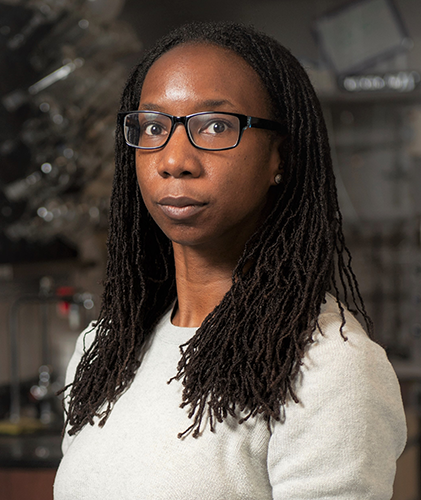Davita Watkins
Professor Davita L. Watkins
Department of Chemistry and Biochemistry
University of Mississippi
Host: Professor Tim Lodge
Supramolecular Polymer Hybrids: Linear-Dendritic Block Colpolymers (LDBCs) as Novel Strategies for Theranostic Nanomedicine
The ability to control molecules and understand their organization into discrete nanoscale arrays that exhibit unique properties affords the opportunity for transformative advances in chemistry and material science. Specifically, for biomaterials and nanomedicine, structural and chemical variations at the molecular level will influence the morphology and mechanical properties as well as the stability and degradation rates of the resulting material. Herein, a library of self-assembling linear-dendritic block copolymers (LDBCs) comprised of a hydrophilic polyamide-based dendrimer covalently linked to a hydrophobic linear polyester will be highlighted. These polymers are shown to be capable of forming a variety of supramolecular aggregates in water—particularly those possessing a biomimetic nature. In this lecture, the synthesis and characterization of the LDBCs library as well as their resulting nano- aggregates will be discussed. Results of this study demonstrate the significant contribution of “bottom-up” approaches towards efficient materials for bio-imaging and theranostic nanomedicine.
Research
Designing vesicles with features such as uniform size distribution, biocompatibility, and tailored transport properties, presents a challenge for the fields of nanotechnology and nanomedicine. Dendrimers have shown to be promising delivery vehicles in biomedical applications. As molecular carriers, their branched layered architectures display a high number of controlled terminal groups as well as cavities for physical entrapment. Only in recent years have dendrimers comprised of heterogeneous segments (Janus dendrimers) been designed for biomedical application.
The objective of this research is to design and synthesize a series of supramolecular amphiphilic Janus dendrimers comprised of biocompatible polymeric segments that can self-assemble into narrow size distributed nanoparticles. These dendrimers are designed to combat issues often faced in nanomedicine such as biocompatibility and tunable transport properties. Our work will cast a new light on the design of supramolecular systems for biomedical applications.
Davita Watkins
A native of Memphis, Tennessee, Davita L. Watkins obtained her B.S. in Chemistry and Anthropology from Vanderbilt University in Nashville, Tennessee. After working briefly for a bioanalytical company, she received a Ph.D. in Chemistry from the University of Memphis under the tutelage of Dr. Tomoko Fujiwara. As a doctoral candidate, she developed and established multi-step synthetic methods for a series of stimuli-responsive materials. In 2012, she accepted a postdoctoral position at the University of Florida in Gainesville, Florida, with Dr. Ronald K. Castellano, where she developed novel self-assembling organic materials for photovoltaic applications. In 2014, she began her independent academic career at the University of Mississippi, focusing on design guidelines towards functional materials with tunable properties through molecular self-assembly. Her research strategies have afforded materials with applications that range from solar-harvesting supramolecular polymers to nanosized diagnostic agents. Dr. Watkins is the recipient of several awards, including the Oak Ridge Associated Universities Ralph E. Powe Award, a National Science Foundation CAREER Award, a Polymeric Materials: Science and Engineering American Chemical Society Young Investigator Award and the Lloyd N. Ferguson Young Scientist Award. She has been named an International Union of Pure and Applied Chemistry Young Observer (2021) and Emerging Investigator (2018) by the Journal of Materials Chemistry C. Alongside her research efforts, Dr. Watkins is an active voice for initiatives to increase minorities and women in STEM.
